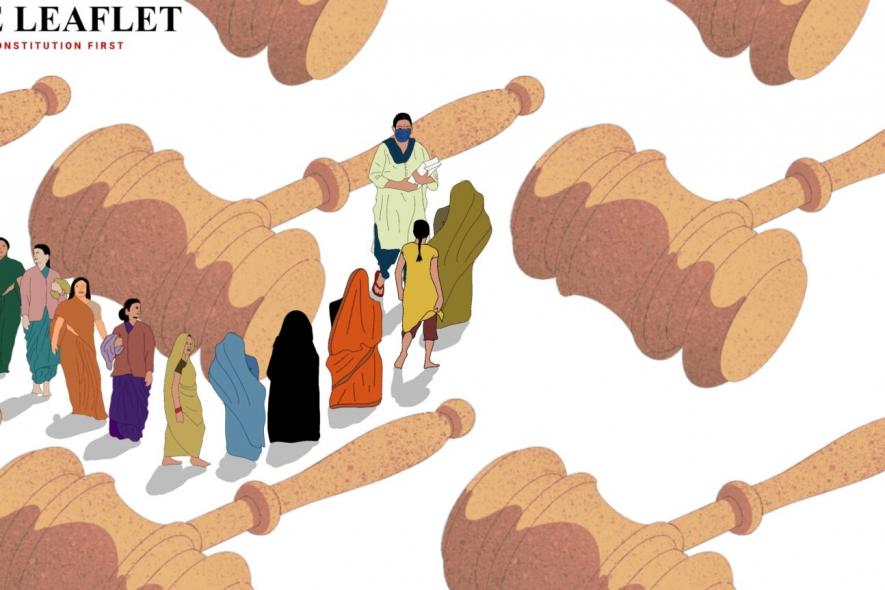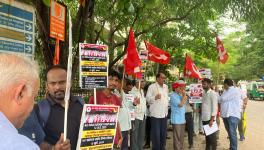Making Legal Aid Effective for Women Prisoners

If we are to do any justice to the Constitutional mandate of equality before law, and the right to legal representation, we must put in place a mechanism to provide competent and effective legal aid to all those who cannot afford it, particularly to those languishing in jail.
I was in Byculla Jail, Mumbai, between February 2020 and December 2021. Prior to that, in Yerwada Jail, where I was lodged between November 2018 to February 2020, I had given an application to be permitted to help with legal aid, but that was refused, possibly since I and my co-accused Professor Shoma Sen, were lodged in separate cells in the Phansi Yard. We were not supposed to communicate with any others in the jail. But in Byculla Jail, we were in the barracks, and Byculla is an undertrial jail. Incidentally, the latest report on ‘Women In Prisons’ (2018) by the Union Ministry of Women and Child Development states that 66.8 per cent of all women prisoners are undertrials.
When the news gradually spread in Byculla that I was a lawyer and was willing to help, and that I could write applications to the court for them in Hindi (since I don’t know Marathi), I became sought after. I noticed that there was another reason, apart from the fact that I was one of the few in the jail who had a Criminal Manual that was important in gaining their trust. Whenever I studied their charge-sheets, I did so in strict confidence and would not discuss any woman’s case with any other, as part of a lawyer’s ethics vis-à-vis her clients. Jail is a harsh place and gossip spreads like wild fire, often hitting out in an under-the-belt way, when one is down; so, most women don’t like keeping their charge-sheets with them, and quickly hand them over to their family or lawyer. Often, they hide their charge-sheets even from their own ‘friends’ in jail, with whom they eat or socialise.
Also read: The Three Ps Women Prisoners Battle: Prison, Pandemic and Patriarchy
Illiteracy, lack of awareness, and information asymmetry
I expected a lack of legal literacy, but was taken aback by the extent of general illiteracy – inability to read and write – that I encountered in jail. The fact that someone can sign her name, is in fact counter-productive, if she is actually incapable of having read what she has signed. This observation of mine was confirmed by the enthusiastic response to the basic literacy classes that my co-accused Jyoti Jagtap and her bunch of young educated friends started. Unfortunately, these were nipped in the bud by the COVID-19 pandemic. I would guess that around 80 per cent women were unable to read or write Marathi (and certainly not English); though some of them did know one of Urdu, Bengali, and Kannada (and the foreigners mostly knew Spanish).
Most traditional criminal lawyers basically bank on the lacunae of the prosecution, but today, with increasingly hyper-moral judgments being made in many categories of cases involving women, it is important to know the real story to appreciate how relatively innocuous acts of women have been made immoral and criminalized by the use of draconian laws and provisions.
The first task usually began with getting their UT [undertrial] Card provided by the Jail properly filled up – that is, with the details of Crime, FIR [first information report] Number, Police Station, Court, and Sections of the laws under which the undertrial was charged. Without these details, a lawyer could not have looked up their case status online. I noticed that with many women demanding that their UT Cards be properly filled up, the jail did respond by providing a new set of better filled UT Cards.
I would try to explain the charges to them, when they were covered by the Indian Penal Code; but since I did not have copies of any of the special legislation like the Protection of Children from Sexual Offences Act, the Immoral Traffic (Prevention) Act, the Narcotic, Drugs and Psychotropic Substances Act, the Maharashtra Control of Organised Crime Act, 1999 [MCOCA], the Passports Act, and the Foreigners Act, under which many of them were charged, and neither were copies of these Acts available in the Library, even that was often difficult.
Then came understanding the charge-sheet. As I said, many women were often too scared or illiterate to even attempt to understand it and promptly sent it away (if served in jail), to their family members to hand over to their lawyers. The fact that they could contribute to what the lawyer was going to argue by pointing out which facts had been misrepresented, distorted, suppressed, or outright falsified, was something that the know-all lawyers never seem to have made clear to them. And, of course, if they did not have a family member to follow up with the lawyer, by explaining their side of the story, all the lawyer would have to go on was the prosecution’s story. Most traditional criminal lawyers basically bank on the lacunae of the prosecution, but today, with increasingly hyper-moral judgments being made in many categories of cases involving women, it is important to know the real story to appreciate how relatively innocuous acts of women have been made immoral and criminalized by the use of draconian laws and provisions.
This was particularly visible in the cases of women charged with MCOCA who were almost invariably the wives, girlfriends, or mothers of absconding gangsters. They were thus, literally legal hostages, since the Investigating Officers in their cases were only too well aware that they had little nexus with organised crime, and that their associations with the gangster concerned were only personal.
There were many women who had been more or less abandoned by their families, particularly those under murder charges, whom neither the filial nor the matrimonial families were willing to accept. The 2018 Report puts the proportion of women prisoners charged with murder at about 37 per cent. Considering that many of these women are completely dependent on legal aid, the efficacy of such legal aid can literally be a life-and-death issue.
Also read: A Case for the Release of All Women Undertrial Prisoners
How the pandemic worsened the plight of female prisoners
The period that I was in Byculla Jail, also coincided with the first and second waves of the COVID-19 pandemic. In those circumstances, the problems with legal aid were greatly exacerbated. That period was exceptionally bad for all undertrials, including those with perfectly competent lawyers, because they were not taken to courts, their family mulakats were stopped, and even the courts basically pressed the pause button on all trials. Later, particularly with the efforts of the People’s Union for Civil Liberties in moving the High Court, telephone calls were started with family members. Even then, to get to speak to one’s lawyer, the lawyer would have to send an email to the jail, and then the jail would permit a telephone call. In other words, the communication was one-way; the prisoner could not approach her lawyer at will. In that period, I did not hear of a single legal aid lawyer sending an email to the jail.
Should not there be a reasonable number of competent, well-paid legal aid lawyers prepared to defend citizens in their highly unequal legal fight against the State? It is this that the Legal Services Authority should be really providing, rather than holding seminars with pomp and show.
To my horror, I found that many women who had signed vakalatnamas for legal aid lawyers (there were two types of such lawyers – those provided by the District Legal Services Authority, and those provided by the social workers of an NGO), did not even have the full name, mobile number, or address of their lawyers. This made any communication with the lawyer only possible when they went to court, and if their lawyer turned up there. Interestingly, when I tried to obtain court orders of other prisoners by requesting my own lawyers to search them online and send them by post, I was reprimanded by the Superintendent during his round.
Even during the pandemic period, new admissions to jail were taking place after first placing the accused person in quarantine; investigations were going on, and charge-sheets were being filed. However, where women had legal aid lawyers and no family members, they would often not know whether a charge sheet had been filed and picked up by the lawyer, or whether it had not been filed at all. Many women lost out on the opportunity to be released on default bail, for which I personally wrote a number of applications.
In regard to the grant of interim bail also, women prisoners were sorely disappointed with the attitude of the courts, which possibly took refuge under the over-cautious wording of the initial order of the High Powered Committee constituted by the state of Maharashtra. This stressed that interim bails should not be granted automatically but with due regard to the nature of the crime, and also exempted many special Acts from the purview of interim bail altogether. I had written a large number of applications for interim bail for women above 75 years of age; those with severe diabetes, asthma, HIV, and cancer; and for pregnant women or women with infants. Very few women were released, possibly only those charged with theft. Here, the failure was not of individual legal aid lawyers but the entire Legal Services Authority which ought to have taken up the question of decongestion of jails proactively and with more seriousness. The fact was that there was no one to represent the prisoner on applications sent by the jail, and the court, swayed by the arguments of the prosecution, generally dealt with the applications like a bail on merits.
Byculla Jail was fortunate in the first wave, but the second wave saw around 60 women sent to the COVID care centre and also one death. Mathurabai Kale – an elderly woman of the Mang community (which is listed as a Scheduled Caste), around 60 years old, a patient of high blood pressure and severe joint swelling – died in May 2021, even when bail had already been granted to her on the basis of furnishing a surety of Rs. 15,000.
Also read: How many more Manjula Shetyes before Prison Management becomes Gender Sensitive?
Urgent need to reform legal aid service
I am well aware that the remuneration of legal aid lawyers is poor. Even when I was a member of the Chhattisgarh State Legal Services Authority between 2014 and 2017, I remember the efforts of the Chairman, Justice Pritinker Diwakar, to increase the remuneration and improve the quality of legal aid. A legal aid lawyer cannot afford to take certified copies of necessary documents, and mostly we see them arguing out of the court’s copy of the file. Also, during the pandemic, with lawyers being denied travel in local trains, hiring a cab to go to court, let alone for a mulakat, would have been prohibitively expensive.
But on the other hand, if we are to do any justice to the Constitutional mandate of equality before law, and the right to legal representation, we must put in place a mechanism to provide competent and effective legal aid to all those who cannot afford it, particularly to those languishing in jail.
When we visit any High Court, the most imposing structure there is often the Advocate General’s [AG] Office, with a veritable army of well-paid lawyers – Deputy and Assistant AGs, Government Advocates, panel lawyers and so on, not to mention an excellent library and secretarial facilities. All these are to defend the State. Do citizens not deserve even half of such expense for Legal Aid Services? Should not there be a reasonable number of competent, well-paid legal aid lawyers prepared to defend citizens in their highly unequal legal fight against the State? It is this that the Legal Services Authority should be really providing, rather than holding seminars with pomp and show. My experience of teaching bright young law students tells me that if there is an option of being paid a reasonable sum as a legal aid lawyer, the pressures to drop out of litigation and join a corporate firm could be practically resisted, and we would be able to get a good crop of enthusiastic legal aid lawyers.
Also read: All that is Wrong with Indian Budgets for Prisons
I did try to give the following suggestions, once in writing in the suggestion box of the jail, and the second time at an Awareness Camp held by the District Legal Services Authority and High Court Legal Services Authority in the jail premises:
1. Whenever a prisoner signs the vakalatnama of a legal aid lawyer, she should be provided the full name, mobile number and address of the concerned lawyer. There must be a mandatory mulakat with the prisoner to learn her side of the story, and what her specific needs are. (There are women with serious physical and mental ailments, or with children, or who do not understand the language of the court, for instance.)
2. After the filing of charge sheet, there must be a mandatory mulakat with the prisoner to explain the charges and evidence, to gather her response, and so that she may be informed of her options in pleading guilty, facing trial and plea bargaining, among other things.
3. If the charge sheet is not filed in time, the legal aid lawyer must see that the prisoner is aware of, and is able to avail of, her precious right of default bail.
4. The legal aid lawyer must have a compulsory mulakat every three months with the prisoner if court hearings are not frequent enough.
5. The legal aid lawyer should urge the jail authorities to inform them regarding major events in the prisoner’s life such as illness, hospitalization, death in the family and so on so that they can provide the necessary succour to the prisoner.
6. On every substantial hearing date such as the filing of bail, arguments, order on bail, evidence and so on, the lawyer must inform the prisoner the gist of proceeding through a postcard at least, when she is not produced before the court.
7. The Legal Services Authority should provide facilities and remuneration at a realistic rate so that the lawyer can meet the prisoner frequently, access records, conduct research and ensure a fair and speedy trial for the prisoner.
On this International Women’s Day, let us think of women prisoners and work towards ensuring that they get justice, by providing competent and effective legal aid to them.
(The views expressed are personal.)
The author is a human rights lawyer, trade-unionist, and activist who has spent her life defending and protecting Adivasi and workers’ rights.
Get the latest reports & analysis with people's perspective on Protests, movements & deep analytical videos, discussions of the current affairs in your Telegram app. Subscribe to NewsClick's Telegram channel & get Real-Time updates on stories, as they get published on our website.
























